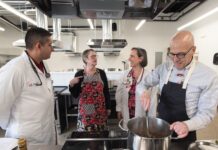
UofL’s REACH program was selected as the winner of the 2017 National College Learning Center Association Innovative Use of Technology Award. Mark Woolwine, who created the Online Student Success Seminars for UofL students, will be recognized at the NCLCA national conference in September and presented with the award.
Woolwine, who is also the coordinator for GEN 105, has worked at REACH since 2009. The seminars he created incorporate gamification elements to increase students’ active learning and engagement with topics that help build stronger academic skills and decision-making behaviors. He decided to include elements of gamification based on the research he was reading.
“I feel that it resonates with our target demographic at UofL. Many students play video games, so why not help them learn through a similar approach?” he said.
That gamification approach is one of the program’s differentiators. Another is the customization of the content, which was made possible when REACH switched to the Articulate Storyline software.
“(Seminars) are geared towards the topics we feel students at UofL need. Each online seminar mentions various resources around campus. I also think the interactive components set us apart. For example, the online test-taking seminars ask students to answer questions related to test, and based on how they answer they may see information on particular strategy for overcoming test anxiety,” Woolwine said.
Because of these types of details, Woolwine admits he wasn’t too surprised when the award was announced.
“I knew that we had a really unique and innovative program. I have presented at several conference on our program and many conference participants mention that they felt the program was innovative,” he said.
REACH’s evolution
REACH has offered onsite seminars for UofL students since 2000. When Woolwine joined UofL, he identified a need for the seminars to also be offered online. He created “Version 1.0” of the Online Student Success Seminars, which consisted of two YouTube videos that were recorded in Spring 2010.
“For these videos we recorded our onsite seminars and layered the slides and other materials into the videos. The topics we choose for the Version 1.0 were time management and study skills,” Woolwine said.
But, the YouTube videos did not provide the level of interaction the team was craving, so they developed Version 2.0 in Spring 2012 using Adobe Captivate 5.5. Topics were textbook reading and becoming a disciplined student.

“These new interactive seminars allowed students to not only complete the activities from the digital handouts without printing them, but they could also answer questions, complete assessments, drag and drop items, highlight items, etc.,” Woolwine said.
This version provided more interaction; however the seminars relied on Adobe Flash, which has limits, and so Woolwine sought to create another iteration. Version 3.0 was introduced in Summer 2013 using Articulate Storyline, with the topic test taking.
That fall, REACH How-to-Guides were introduced, focusing on the topics final exams, time management, note taking and textbook reading. The fourth interactive seminar on note taking was developed in 2014.
Throughout the development of these online seminars, Woolwine became more interested in e-Learning and Instructional Design and enrolled in the Masters of Science in Human Resources and Organization Development in the College of Education. During his studies, he read up on the work of Karl Kapp, a leading researcher on gamification, which inspired him to develop the idea of the 5th online seminar: “The Quest for Time,” focusing on time management.
In this seminar, students must help save “Alex” a student at UofL who used bad time management practices and turned into a zombie. They must navigate across the “campus” and learn time management strategies to help save “Alex.”
Woolwine is currently in the process of redesigning the “Studying Smarter” online seminar using Articulate Storyline. It, too, will incorporate gamification elements.
“The idea behind this new seminar will be that students are in a ‘breakout‘-type of room and must investigate the various clues located around the room to unlock the various doors and escape,” he said.
The REACH team also plans to add a preparing for finals topic to the online seminar program and has been discussing other new topics to include.
As the program has evolved, so too have the participation numbers.
In the fall 2011 semester, 13 students completed an online seminar and 558 completed an onsite seminar.
In the fall 2016 semester, there were 2,023 requests for online seminar with total of 920 completions, and 1,012 requests for onsite seminars and 692 completions.
The number of students who completed seminars at REACH increased from 572 in 2011 to 1,612, which is roughly a 282 percent increase.
NCLCA Award
The Innovative Use of Technology Award was created at the NCLCA Conference in 2010 to recognize “individuals, learning centers or institutions that use innovative technology solutions on the learning center to improve student learning, assist learners who may learn different, improve resource usage, increase student engagement, or enhance learning strategies.”
More information and past winners are available online.































